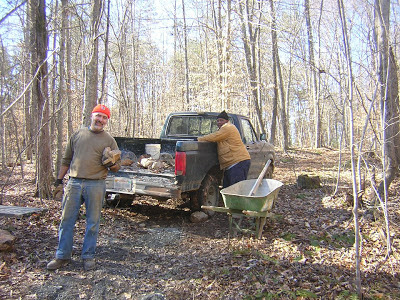I check our "Root Shelter," fashioned from a Cold-War Fallout shelter, weekly. So far the pumpkins and garlic in there have held up well, but I've had a special concern about the small harvest of sweet potatoes (no more than 25 pounds) that we gleaned this year. A neighbor gave me another 25 pounds, and I've kept them in a cool utility room. I've been planning to move them to the Root Shelter but have been rather lazy about it.
Finally I went to check things today. I am glad I did. The tubers already there were wrapped in newspaper to absorb any moisture and put in bushel baskets with lots of air circulation. The door is tight and features breathing holes with 1/4" hardware cloth. The walls are cinder block and the whole thing is underground.
 Imagine my disgust when over half our sweet potatoes had been gnawed by mice! I took a basket full of basket cases out to our compost heap.
Imagine my disgust when over half our sweet potatoes had been gnawed by mice! I took a basket full of basket cases out to our compost heap.Our pumpkins, garlic, and pearl onions were fine, untouched by the little gluttons.
This warning meant going back to the drawing board about the Shelter and how food get stored. Baby mice can squeeze through an opening the diameter of a pencil; adults, I've read, can get through a hole the size of a human pinkie. They can gnaw wood and plastic with ease. Metal will stop them. So will our building's resident black snakes, which are hibernating now, and barn cats.
We don't have a barn cat with access to the building, since we keep it locked. Killing mice myself poses no moral problems at all, but I won't employ poisons. A dead mouse could be eaten by our predators, killing our pest control service! Poison could also find its way onto the food in the shelter. I am not squeamish at all about setting snap-traps, but the potatoes still needed better storage. Next year we will harvest a large number of Kabocha Squash for a local restaurant, and I don't want this happening again for a cash crop.
 Homesteading and survivalist forums are full of tales about how to store things in root cellars. Mice can gnaw through plastic, so a simple ventilated tote would not do.
Homesteading and survivalist forums are full of tales about how to store things in root cellars. Mice can gnaw through plastic, so a simple ventilated tote would not do.Some folks employ metal trash cans, which I have used with great success for feed for our chickens, cats, and the dog. Drilling lots of holes (no more than 1/4" across would not be too onerous, but I had a tote and hardware cloth. So I got right to work.
My invention involved using a tote with a removable, one-piece top, rather than a hinged one. I cut away all but the rim, so the contents would breathe, and put hardware cloth inside, fastened to the plastic by screws and washers. Next I lined the inside of the tote with more hardware cloth, after drilling lots of 1/8" holes all over the tub's bottom and sides. The metal sides come up high enough to meet the wire on top.
I plan to check this frequently, especially now that I have some snap-traps down, baited with peanut butter. I hope we have sweet potatoes come spring! None of our seed potatoes were eaten, so we'll be starting fresh for a bigger harvest in 2016.









